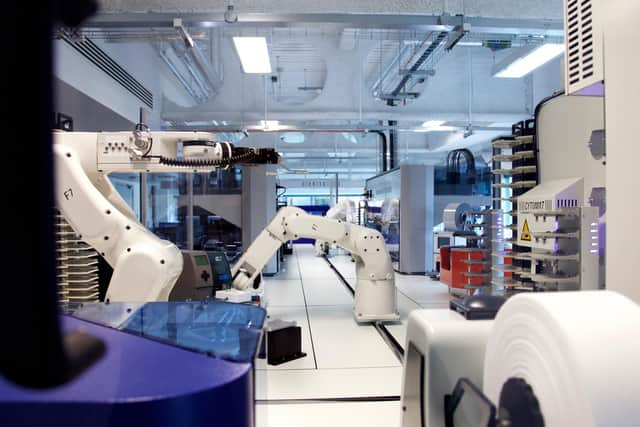Boost for cancer, haemophilia and arthritis treatments as University of Edinburgh takes lead on biotech project
and live on Freeview channel 276
The partnership involving FujiFilm Diosynth Biotechnologies (FDB) has secured funding from the Engineering and Physical Sciences Research Council (EPSRC) and the Biotechnology and Biological Sciences Research Council (BBSRC), both of which are part of UK Research and Innovation.
The £8.7 million, five-year research collaboration will use “state-of-the-art analytical tools” and engineering biology approaches to enable cost-effective manufacturing of biological drugs.
Advertisement
Hide AdAdvertisement
Hide AdThese drugs are based on technology which brings together genetic material from different sources. They have transformed the treatment of life-limiting diseases including cancer, haemophilia and rheumatoid arthritis.


The University of Edinburgh has led a three-university partnership with FDB since 2018. That tie-up and its successful application for prosperity partnership funding have been supported by Edinburgh Innovations, the university’s commercialisation service.
Susan Rosser, professor of synthetic biology at the University of Edinburgh and Royal Academy of Engineering chairman in emerging technologies, who is leading the academic team in the collaboration, said: “The award of this grant unlocks the power of new technologies we have developed and applies them to this key industry challenge.
“The aim is to better understand and improve one of the key cell-based manufacturing platforms of biopharmaceuticals. Ultimately it will mean that treatments and vaccines used by many millions of people worldwide will be easier and cheaper to manufacture.”
Advertisement
Hide AdAdvertisement
Hide AdAndy Topping, chief scientific officer at FujiFilm Diosynth Biotechnologies, said: “We are delighted with the partnership we have with the University of Edinburgh and it is aligned with our core purpose to advance tomorrow’s medicines.
“We are a supporter of great science in the United Kingdom. This is an exciting project that will allow us to understand, model and ultimately design CHO [Chinese hamster ovary] cells to be more efficient.”
George Baxter, chief executive of Edinburgh Innovations, added: “This major funding award shows the leading position of Edinburgh and our partners Manchester and York as successful collaborators with businesses and other organisations.
“Only by working together can academic researchers and commercial businesses both maximise the impact of their work, for mutual benefit and common goals.”
Advertisement
Hide AdAdvertisement
Hide AdNine prosperity partnerships have been announced by the UK government, funded with investment of £75m from business, academia and UK Research and Innovation.
They will build on existing UK strengths in industry and academia to develop new technologies, processes and skills that will deliver economic growth and create jobs across the country.
UK business secretary Kwasi Kwarteng said: “Tapping in to the expertise of some our finest scientists and researchers, including at Teesside’s FujiFilm Diosynth Biotechnologies and the University of Edinburgh, this state-of-the-art collaboration will seek to accelerate the development of biological drugs to help treat those with life-limiting diseases such as cancer.”
He added: “This is part of our efforts to put the funding and structures in place to ensure we build back better through innovation, drive local economic growth and cement the UK’s status as a science superpower.”
A message from the Editor:
Thank you for reading this article. We’re more reliant on your support than ever as the shift in consumer habits brought about by coronavirus impacts our advertisers. If you haven’t already, please consider supporting our trusted, fact-checked journalism by taking out a digital subscription: www.scotsman.com/subscriptions
Comment Guidelines
National World encourages reader discussion on our stories. User feedback, insights and back-and-forth exchanges add a rich layer of context to reporting. Please review our Community Guidelines before commenting.